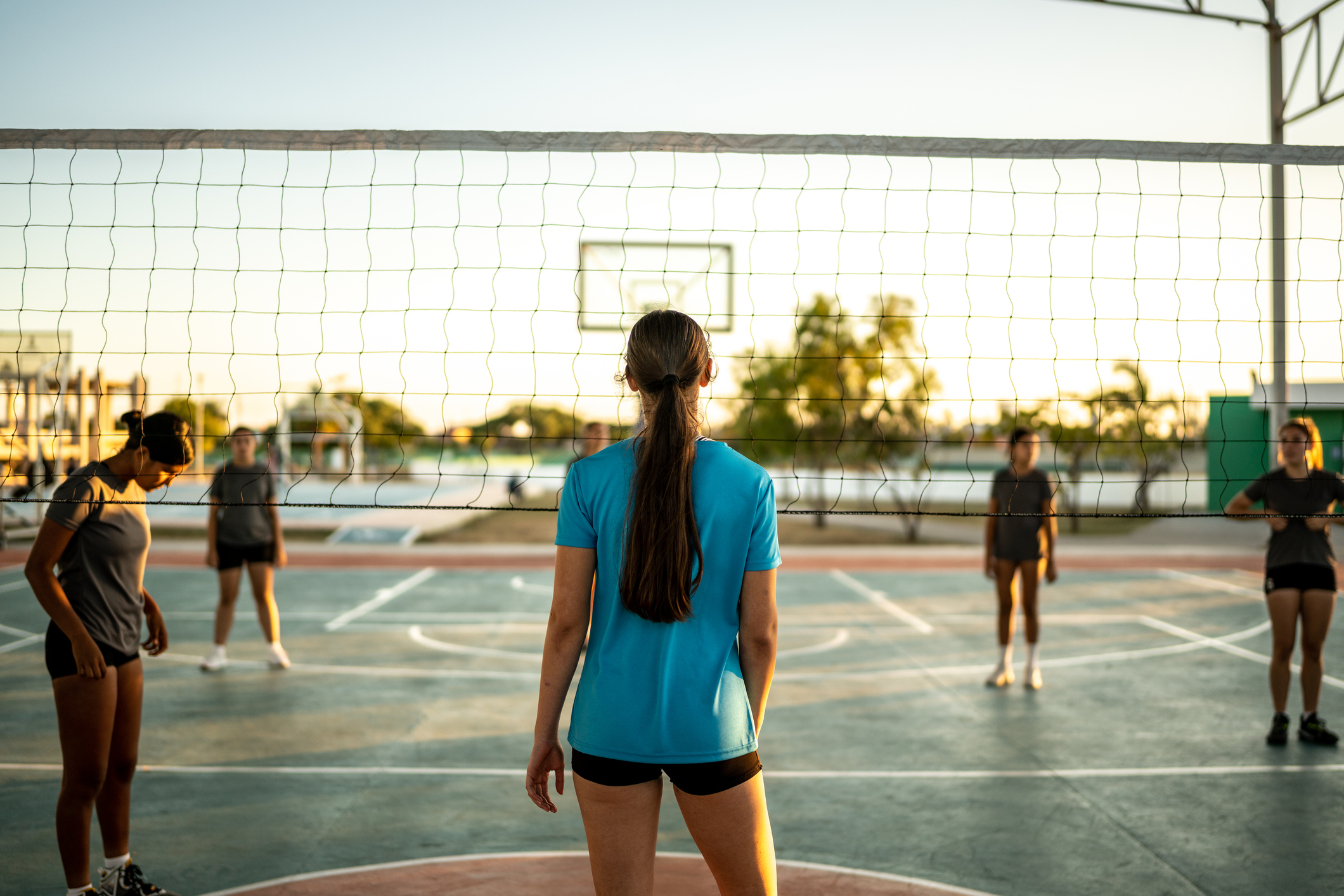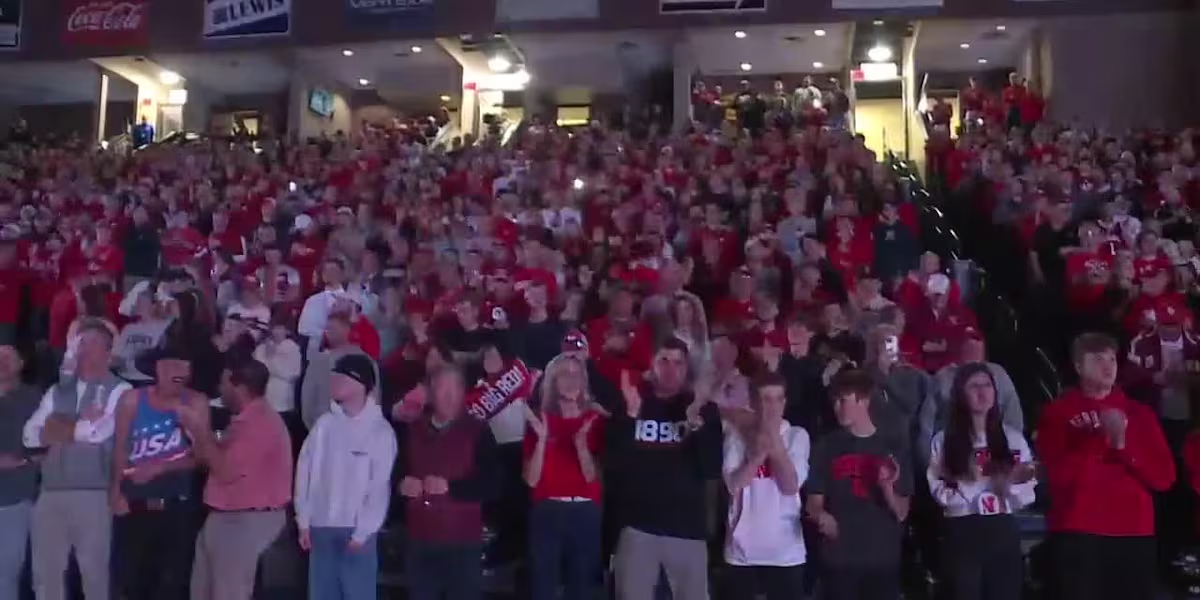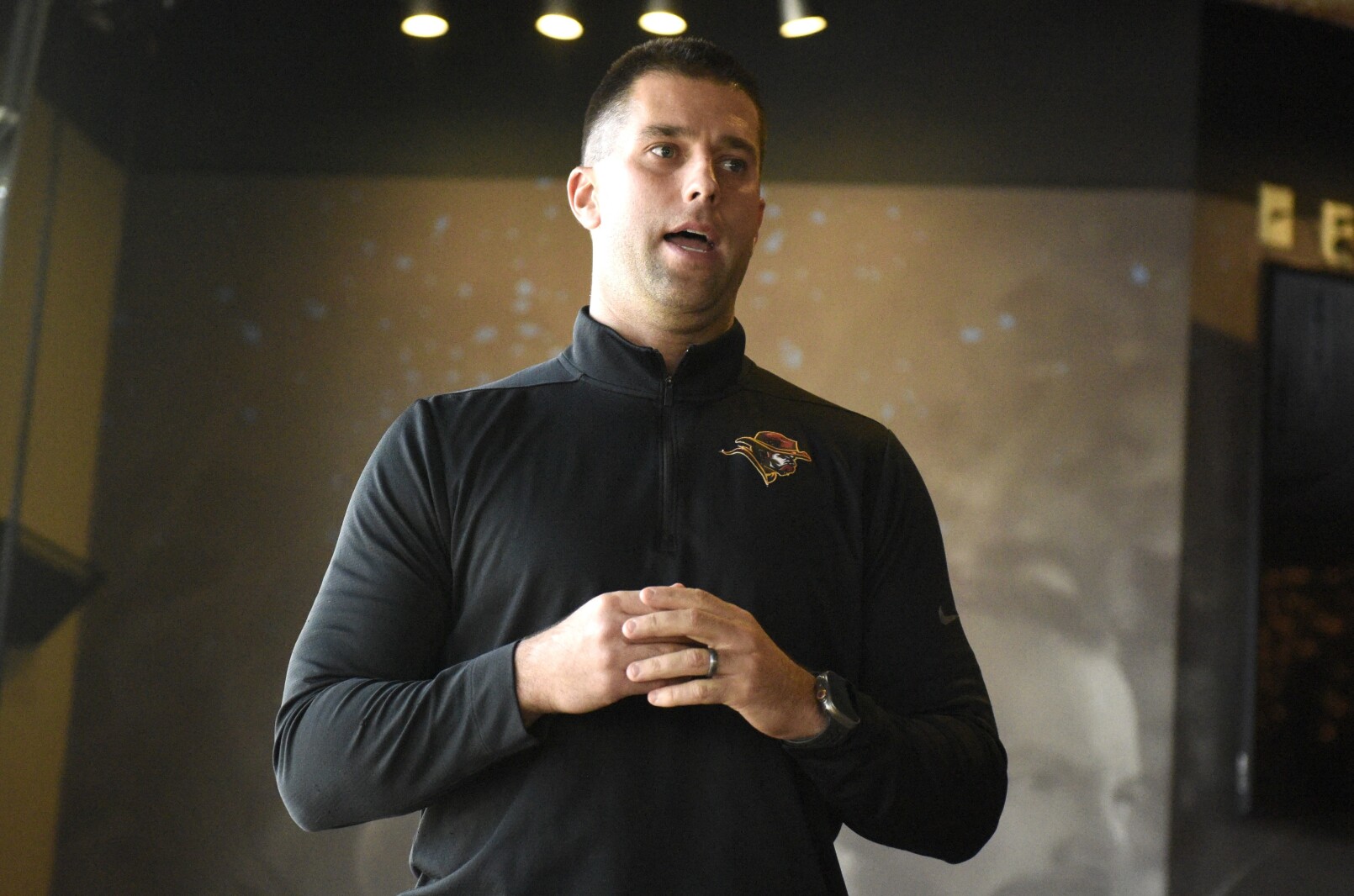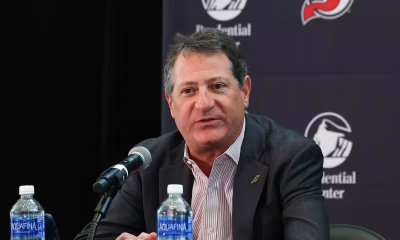Rec Sports
Maine community not backing down from Trump’s transgender athlete attacks

President Donald Trump has filed a lawsuit against Maine over the state’s failure to comply with his executive order banning transgender girls from participating in girls’ sports teams at schools, marking an escalation in an ongoing feud between the state and federal government.
On April 16, the Department of Justice filed the lawsuit against Maine over its alleged violation of Title IX, a federal civil rights law banning sex discrimination in schools and colleges, for allowing transgender girls to play on girls’ sports teams at schools. The lawsuit claims that Maine policies expose female athletes to “heightened risks of physical injury and psychological harm” and “denies them equal athletic opportunities,” echoing misconceptions about transgender girls in sports, NPR reported.
Amid the ongoing battle between the state and the federal administration, local community members in Maine, including teachers, LGBTQIA+ advocates, and the governor, have adamantly pushed back on Trump’s fascism and punitive actions against the state.
“We’ve seen so much support for trans youth and trans folks in general coming together, whether that is individuals in certain communities standing up to school boards, or even [Maine Gov.] Janet Mills speaking directly to Donald Trump in support of trans people, which is so great to see, and something that I don’t think would be the same in a lot of different states if they were facing this issue,” Ellie Roy, the communications coordinator at Out Maine, told Prism.
A battle with the Trump administration
The ongoing feud between the state and federal government started in February, when Republican state Rep. Laurel Libby doxxed a transgender athlete in Maine in a social media post. In the post, she referenced the Maine Principals’ Association’s policy that allows transgender athletes to participate in scholastic sports in accordance with the Maine Human Rights Act, a longstanding law that grants protections from gender identity discrimination in employment, education, housing, and public accommodations.
Shortly after a meeting with governors on Feb. 21, Trump threatened to pull funding over the state’s refusal to comply with his executive order, resulting in a public spat with Mills.
Bre Danvers-Kidman, the executive co-director of Maine TransNet, told Prism that Libby’s attack thrust Maine into a national spotlight, prompting attention from Trump.
“Maine, for 20 years, has offered greater protection to trans people than the federal government requires us to. The president can’t just unilaterally sweep those protections away just because he feels like it. That’s not how the law works,” they said.
The state and federal governments have continuously clashed over the issue this year, with judges blocking efforts to withhold federal funding.
“At the federal level, trans youth in particular are being used as a scapegoat for a lot of different ongoing political issues [and] just being used as a weapon to further the agenda of more conservative folks, which is deeply unfortunate and completely unfair to that population who is already facing so much hate and discrimination,” Roy said.
Following an investigation, the U.S. Department of Health and Human Services Office for Civil Rights determined on March 17 that the Maine Principals’ Association; the Maine Department of Education; and Greely High School in Cumberland Center, Maine were in violation of Title IX.
Both the association and the high school refused to comply with the executive order, despite the investigation’s conclusion that they would “continue to follow state law and the Maine Human Rights Act.”
Shortly after receiving a notice from the U.S. Department of Agriculture on April 11, Greely High School was unable to access its funds for its child nutrition program, prompting the state to file a lawsuit against the Trump administration to reinstate access. A federal judge issued a temporary restraining order the same day, ordering Trump to unfreeze Maine’s federal funds.
In an emailed statement to Prism, Maine Education Association President Jesse Hargrove said that although the funds given to Maine’s school districts are essential for its students and educators, “it is equally important to create affirming communities where all students, regardless of race or gender, are respected and safe.”
Allies stand in support of Maine’s transgender athletes
Several rallies have been held across towns in Maine this year. On March 23, transgender athletes, parents, and state representatives gathered at Greely High School to stand in solidarity with trans students.
Danvers-Kidman, who also attended the protest, said the protest was especially heartwarming because it was led and organized by the community, rather than local LGBTQIA+ organizations.
“The support for the trans students in that school was overwhelming. It is clearly a majority that is completely fine with the trans girls, trans people in general, participating in school sports. It should be a nonissue,” Roy said.
Stacie Bourassa, a parent of a transgender athlete who attended the protest with her husband Andrew, told Prism that she wanted to cry seeing thousands of people supporting transgender students.
“That day showed me we have a majority. We have common sense. We want to support our youth and people of all identities, so we are not the minority,” she said.
Prism reached out to several trans athletes in Maine, who declined to comment due to doxxing risks.
Transgender people fight for belonging in sports
The Bourassas’ transgender child was a top student athlete growing up, playing several sports and engaging in various extracurricular activities at school. But he “knew firsthand how unwelcoming” his peers and teachers were, Stacie Bourassa said, noting that he experienced discrimination and hostility that led him to quit school sports at age 15.
“It was a very painful experience to see his options limited as just an exceptional, remarkable member of his school community, with a lot of privilege and resources and still not those options of equal participation,” she said, adding that her child is now thriving as an adult.
Stacie explained that the debate on transgender kids in sports is a red herring, and that if it were a real issue for transgender kids to play on their school sports teams, then “we would have heard about it 40 years ago, way back when trans people started openly competing in sports.”
“It’s not really about supporting kids or supporting women’s sports. They’re not putting resources toward that. We know they’re underfunded. They don’t have the things they need,” Andrew Bourassa said. “These bills are about exclusion. They’re not about inclusion.”
Since his presidential campaign, Trump has spread transphobic rhetoric and been a strong opponent of transgender inclusion in sports, among other transgender rights.
Opponents argue that transgender girls have an unfair advantage over athletes who were assigned female at birth. However, experts argue that there is a lack of evidence to support this claim. According to the American Civil Liberties Union and medical experts, transgender athletes’ abilities vary, similar to cisgender athletes, and everyone has different advantages regardless of gender.
Andrew added that research has shown that transgender student athletes gain much from participating in sports, including resilience and skill-building that enables them to become successful individuals.
Roy said that a blanket ban on transgender girls’ participation in school sports won’t just hurt transgender people, but all girls, especially girls of color, because it could result in them being subjected to invasive gender tests. While these tests aren’t being proposed in Maine, they’re happening in other states like Texas as part of a new transgender policy, with a proposed requirement that athletes who compete in women’s sports undergo these tests.
“It blatantly violates their privacy, and that will become the reality if bans like this were to go into effect. That’ll affect not just trans girls, but all girls, all kids in general,” she said. “It’s going to make school communities really fearful and distrustful of the leadership in the state and at the school level, not to mention also confusion for students, families, educators, everybody.”
She continued: “This sports ban is just a way to further misogyny, the idea that girls can’t be strong on their own, and if they are strong, then ‘Oh, they must have been born a man,’ which is so discriminatory and hateful and just honestly disgusting.”
Maine refuses to back down
Following the lawsuit filed by the Trump administration against Maine, both Mills and Maine Attorney General Aaron M. Frey released statements once again emphasizing their refusal to back down.
“This matter has never been about school sports or the protection of women and girls, as has been claimed, it is about states rights and defending the rule of law against a federal government bent on imposing its will, instead of upholding the law,” Mills said, adding that she will “vigorously defend [the] state.”
Danvers-Kidman said this battle with the administration distracts from other issues transgender people are facing under this administration, such as a policy that bars changing gender markers on passports and the use of the “X” marker for gender identification.
Despite Trump’s ongoing attacks and threats built on debunked myths about transgender people, LGBTQIA+ advocates anticipate that state leaders and community members won’t back down or give in.
“Speaking from my own perspective, we are not willing to compromise on trans rights or queer rights in general. And that is the mindset that most organizations here in Maine are operating under. We will continue to fight,” Roy said.
Editorial Team:
Carolyn Copeland, Lead Editor
Lara Witt, Top Editor
Stephanie Harris, Copy Editor
Related
Rec Sports
Southern implementing “YOU Matter Here” campaign | News, Sports, Jobs
SALINEVILLE – Southern Local Schools will soon implement a campaign in partnership with the Columbiana County Educational Service Center to inform students that “YOU Matter Here.”
District Federal Programs Coordinator Kristy Sampson said plans will begin in January to begin brainstorming strategies which stress students’ importance in both the school and the community. The project stems from a developmental asset survey from the Search Institute conducted by the Columbiana County ESC and involving junior high and high school students countywide who are between the ages of 12 to 18. The developmental assets are building blocks for healthy development to help young people grow up healthy, caring, and responsible.
“Columbiana County ESC partners with the guidance counselors to conduct the asset survey every couple of years with students to determine which of the developmental assets the students have developed and which assets the students need support with. They are going to do a campaign kickoff this year entitled, ‘YOU Matter Here,’ to focus on the main asset categories or pillars identified as areas of need based on student responses, and they are encouraging school districts to review the data and find ways to implement the ‘YOU Matter Here’ concepts with their youth.”
Sampson added that the survey data indicated three main pillars, or categories, where students’ responses indicated a need for support: sense of belonging and self-identity; parental presence and power; and community involvement. The campaign aims to boost awareness and positivity, and she will coordinate a stakeholders’ meeting over the next month to begin planning for implementation at Southern Local.
“We’ll host a meeting with stakeholders to look at our county data and district specific data to move forward in supporting our students. We will work with Melissa Galbreath, the lead for the Columbiana County “YOU Matter Here” campaign to begin our process. This is the first time we’ve done this campaign,” she continued, saying one aspect may be to seek the development of a third space for kids to find enrichment and support. “Research shows that kids who have positive environments outside of home and school possess more of the positive developmental assets.”
But more discussion will be needed before efforts get underway.
“We can plan activities and supports to help our kids here at Southern Local realize they matter here in our buildings, they matter here in our classrooms, and they matter here in our extra-curricular activities as well as in the community,” Sampson said.
Any community member interested in becoming involved with the planning process may contact Sampson at the administrative office by calling 330-679-2343, Ext. 4203, or email kristy.sampson@slindians.org.
Rec Sports
Real Madrid are convinced former youth team defender will come back ‘sooner rather than later’

According to the latest information shared by Rodra via ESPN, there is a growing belief that Jacobo Ramon is destined to return to Real Madrid sooner rather than later.
The journalist mentions that the former youth team defender’s development in Italy has not gone unnoticed.
Advertisement
Currently plying his trade with Como, under Cesc Fabregas, Ramon has taken major steps forward this season, both in terms of responsibility and consistency.
In fact, he has grown into a genuine defensive leader despite being just 20 years old.
His composure, reading of the game, and ability to organise the back line have made him a key figure in Como’s defensive structure.
A smart buy-back option
It is said that Real Madird have been closely monitoring their young centre-backs, aware that defensive renewal is an issue that must be addressed carefully over the coming seasons.
While external signings often grab headlines, Madrid remain committed to developing solutions from within, and Ramon is now firmly part of that conversation.

Real Madrid are keeping a close eye on Jacobo Ramon. (Photo by Marco Luzzani/Getty Images)
Advertisement
One of the key factors keeping Madrid relaxed is the contractual control they still hold.
The club included a buy-back option worth around €8 million, which can be activated next summer.
That clause gives Madrid a clear and affordable pathway to bring him back once they feel the timing is right.
Inside Valdebebas, there is a strong sense that this return is not a question of “if”, but “when”.
What makes Ramon’s case particularly compelling is how quickly he has adapted to senior football away from Spain.
Now, with defensive planning already underway, Ramon is increasingly seen as a natural solution, one who knows the club, understands its demands, and is proving himself step by step at the highest level.
Rec Sports
Pahrump Valley Junior Athletics will help kids develop athletic skills and confidence

Youth athletes looking to improve their technique, mechanics and confidence may find a new home with Pahrump Valley Junior Athletics.
Recently launched by local coach David Wilson, a lead instructor for the Pahrump Valley Junior Golf Association, Wilson’s vision is simple — build strong athletes. Build confident kids. Build a powerful future for Pahrump.
“Our mission is to develop well-rounded, disciplined, confident young athletes who are building the future of our community,” Wilson said. “We train them in a variety of areas, from speed, power, and agility to hand-eye coordination, endurance, and flexibility. The idea is to start younger so that kids have a strong foundation as they move into middle and high school athletics.”
The program comes as part of a broader effort to engage kids in sports early, addressing a common challenge many coaches have seen in Pahrump: students entering middle and high school sports with limited experience and preparation.
Aiming to serve kids in first through twelfth grade, Wilson draws on his years of coaching and playing experience.
From high school and college basketball to local youth programs, Wilson believes starting early is key.
In addition to group sessions, individual training will be available, with plans to work closely with local high school coaches to ensure that kids are prepared for the expectations of middle and high school athletics.
The program will begin this summer at the Pahrump Valley High School track and field, with sessions expected to run three to four times a week.
Fees are still being finalized, but organizers are committed to making the program affordable for all families, with memberships and discounts for multiple sessions.
Wilson’s inspiration comes from a lifelong love of sports and teaching.
Having played basketball at Bakersfield College, Crete Nebraska and coaching for three years at Pahrump Valley High School, Wilson understands the value of positive coaching and mentorship.
“I had coaches who were amazing teachers, and they shaped not just how I approached sports, but how I approached life,” Wilson said. “I want to bring that same experience to the kids here in Pahrump.”
With strong community support, Wilson is optimistic about the program’s impact.
“The community here is awesome — supportive, caring, and invested in their kids. We just want to give back and help kids grow, have fun, and succeed,” he said.
For parents and young athletes eager to get started, the program promises a mix of structured training, skill-building, and, most importantly, enjoyment of sports.
“By the end of the day, it’s about creating a culture where kids want to come, want to play and feel successful,” Wilson said.
To inquire about the program, contact David Wilson at pvjuniorathletics@gmail.com
Contact Jacob Powers at jpowers@pvtimes.com. Follow @jaypowers__ on X.
Rec Sports
Celebrating 100 Division One Basketball games at the Sanford Pentagon

SIOUX FALLS, S.D. (Dakota News Now) -We just heard from Sundance Wicks on Tuesday night about how much he enjoyed bringing his Wyoming Cowboys back to South Dakota to take on the Jackrabbits at the Sanford Pentagon.
Every player and coach I’ve talked to since it was built has raved about the venue.
Our Sam Tastad put together some the reactions we’ve captured after the 100th Division One Basketball game was played on the Heritage Court at one of the coolest courts in the country.
<“I thought it was an unbelievable atmosphere. As good as in college basketball. No one tell me that’s a neutral site game,” said Oklahoma men’s basketball coach Porter Moser.
“It was absolutely unbelievable. I was talking to a Pentagon representative and he said that’s the best environment he’s heard in 100 games that have been here,” said Nebraska men’s basketball player Pryce Sandfort.
“It’s a milestone I wouldn’t of thought we would reach,” said Sanford Sports Vice President of Operations Jesse Smith. “After amount of effort it took to get game one and these Division I games off the ground, I never could have imagined we would be looking at hosting our 100th game.”
“They make you feel super welcome. They treat women’s basketball like its a sport. They put on a show and make us feel great about being here,” said South Carolina women’s basketball coach Dawn Staley.
“To hear people say it is mandatory for people to play a game in the Sanford Pentagon is music to our ears,” said Sanford Sports President of Operations Steve Young.
“It was a home court and please can I take the fans. I think what the Pentagon folks is great. I would love to thank them as well,” said Iowa women’s basketball coach Jan Jensen.
“It felt like a home game with amount of fans there starting chants. You could definitely feel energy there,” said former Iowa Hawkeyes player Lucy Olsen.
“Every game is going to be by recently bias. But it was absolute electric in here. But I would put our experience in our arena with big time major fan support and community support. Major production,” said Young.
“Most memorable game was the Iowa and Gonzaga game that happened during COVID. We got the biggest game. We had Number one in country against the Number three team in the country and no one could come in and watch game. We felt like we were watching a secret scrimmage up until this Saturday with the Huskers was the Northern State national championship game against Ferris State. It ended on a last second shot and this play was loud and so much fun,” said Smith. “100 games means we have put ourselves on map as best in nation for college basketball. That was one of things our leadership had set out to do when we built this facility. We want to be a place for basketball, whether that’s youth basketball, AAU basketball, collegiate and professional. Now we can sit here and say we have checked those boxes. We have met all those goals and we want to keep going. Let’s keep going and do another 100.”
Copyright 2025 Dakota News Now. All rights reserved.
Rec Sports
Brennan’s Pub to Close Permanently After Decades, Hosts Final Turtle Race on Saturday

The event, held Thursdays for over 45 years, involves patrons “betting” on turtles in a ring, with proceeds benefiting charities for unhoused residents
Brennan’s Pub, a longtime Marina del Rey bar known for its turtle racing tradition that has drawn crowds and controversy for nearly 50 years, will close permanently after business Saturday.
An Instagram post from the pub announced the closure, inviting patrons to final hours Friday starting at 4 p.m. and Saturday from noon, culminating in one last turtle race at 9 p.m.
The event, held Thursdays for over 45 years, involves patrons “betting” on turtles in a ring, with proceeds benefiting charities for unhoused residents—raising more than $300,000 total, according to the pub’s website.
The races have faced criticism from animal welfare groups, including a 2024 protest outside the bar organized by In Defense of Animals and others, who argued the noisy environment stresses the turtles and constitutes exploitation.
Bar officials have defended the practice, noting on-site veterinary care, a dedicated habitat and safety rules like no pointing or booing.
The pub, at 4089 Lincoln Blvd., has hosted events including turtle races, trivia and sports viewings.
Rec Sports
Presidents Bowl Basketball Classic returns to Sanford Pentagon – Sioux Falls Live

SIOUX FALLS — A few years ago, Luke Hannemann was serving as an assistant coach under Sioux Falls Roosevelt boys basketball coach Mitch Begeman when the two coaches came up with a simple but bright idea.
For decades, the Presidents Bowl Football Games had served as one of the single-largest fundraising opportunities for booster clubs in the Sioux Falls School District.
Begeman and Hannemann noticed it, and with the holiday break providing the perfect time during the basketball season to put on something similar, the two coaches decided to float the idea to others during an end-of-season coaches’ meeting.
“We just said, ‘Hey, can we make this happen and do something like this?'” Begeman said. “I think all the [athletic directors] jumped on board pretty quick with the idea and obviously being able to fundraise some more dollars for our school district and our activities.
“Here we are three years later and doing this, and that’s really kind of how it all started was just by conversations and collaboration and then bringing it to the administrators.”

Trent Singer / Sioux Falls Live
What emerged was an extension of the Presidents Bowl made for the hardwood.
Hannemann, who is now in his second season as boys basketball coach at Sioux Falls Lincoln, and Begeman will each lead their respective teams onto the court Monday and Tuesday when the third annual Presidents Bowl High School Basketball Classic gets underway at the Sanford Pentagon.
All eight varsity games will be played on Heritage Court. Here’s a quick glance at the schedule:
Monday, Dec. 29
- Girls: SF Lincoln vs. SF Roosevelt, 11 a.m.
- Boys: SF Lincoln vs. SF Roosevelt, 1 p.m.
- Girls: SF Washington vs. SF Jefferson, 3 p.m.
- Boys: SF Washington vs. SF Jefferson, 5 p.m.
Tuesday, Dec. 30
- Girls: SF Jefferson vs. SF Lincoln, 11 a.m.
- Boys: SF Jefferson vs. SF Lincoln, 1 p.m.
- Girls: SF Roosevelt vs. SF Washington, 3 p.m.
- Boys: SF Roosevelt vs. SF Washington, 5 p.m.
A number of sponsors have since teamed up with the Presidents Bowl Committee to assist in bringing the two-day showcase to life.
With a seating capacity of 3,250 — featuring four executive suites, 12 loge boxes and a pair of corner suites — Heritage Court serves as the ideal playing surface for the varsity basketball teams of each city school to gather annually for a holiday showcase.
“They do things the right way with what everybody’s talked about, just the small details of making this kind of a big deal for these kids, and I think that’s the appreciation the coaches all really do see,” Begeman said. “These guys put on such a quality event. It’s great to make it a big deal for these kids because some of these kids may not get to do something like this ever again.”

Trent Singer / Sioux Falls Live
Throughout the day, the auxiliary courts surrounding Heritage Court will showcase junior varsity, sophomore and freshman games between the four city public schools. Meanwhile, a youth basketball clinic has also taken place prior to the showcase.
Begeman knows there’s still a lot that could be done to grow the event in the coming years. He’d like to explore the possibility of allowing the varsity squads to compete for a Presidents Bowl trophy, something the ADs would need to hash out collectively in order to make the logistics work.
But the growth from the inaugural year of the showcase until now couldn’t be made possible without the many volunteers associated with the Presidents Bowl, as well as the financial backing from dozens of corporate sponsors.
“I’m just thankful that people took the conversation that we had four years ago and said, ‘All right, let’s do this,'” Begeman said. “This should be about the kids, and it is about the kids and the experiences. And I think when it makes sense like it does, it got put into action pretty quick.”
Here’s a brief breakdown of each varsity team heading into this year’s Presidents Bowl High School Basketball Classic:

Trent Singer / Sioux Falls Live
- Coach: Tim Reck (5th year)
- Record: 1-2 (lost at Roosevelt 63-58, lost vs. Brandon Valley 63-58, won at O’Gorman 66-58)
- Top returners: Jase Unzen, Colby Nuttbrock, Kwai Mayen, Caleb Goodroad
- Coach’s comments: “I’m really looking forward to playing out at the Pentagon. Talking to my guys, they’ve grown up playing out there. They’re really excited to be playing out there again this year. I know we’ve got two really tough opponents we’re going to have to play, but it’s a great time to also see where we are at the beginning of the season.”

Trent Singer / Sioux Falls Live
- Coach: Shaunteva Pruett (5th year)
- Record: 1-2 (won at Roosevelt 59-48, lost at Brandon Valley 73-44, lost at O’Gorman 76-48)
- Top returners: Brinley Altenburg, Taylor Silvernail, Abby Horner, Lydia Johnson, Macy Bryant, Kaia Pauli
- Coach’s comments: “The Pentagon does a phenomenal job with the venue by just making our kids feel special, from the locker room to the starting lineups to the environment on the court as well. … We have a lot of experience. We graduated one senior last year, so we have six seniors this year on our team.”

Trent Singer / Sioux Falls Live
- Coach: Luke Hannemann (2nd year)
- Record: 3-0 (won at Washington 66-59, won at Harrisburg 66-53, won vs. Yankton 62-38)
- Top returners: Sam Ericsson, Sam DeGroot, Brody Schafer, Lucas Honner, Jaden Haley, Owen Duffy
- Coach’s comments: “It’s a great experience to be able to play at the Pentagon. … We’ve got six seniors this year and a good group of juniors, so we’re kind of heavy in our senior and junior group this year. But they’re a really fun group to be around, and I’m just lucky to be coaching those guys.”

Trent Singer / Sioux Falls Live
- Coach: Zach Wessels (2nd year)
- Record: 0-4 (lost at Yankton 61-10, lost at Washington 57-12, lost vs. Harrisburg 50-17, lost vs. Tea Area 58-26)
- Top returners: Ingrid Ready, Regan Van Meeteren
- Coach’s comments: “We have a lot of girls who haven’t played on that floor yet, so that’s going to be a ton of fun just being under the lights and stuff. We’re a pretty young team. We have one senior and one junior. … We’re just excited to go play out there.”

Trent Singer / Sioux Falls Live
- Coach: Mitch Begeman (10th year)
- Record: 3-0 (won vs. Jefferson 63-58, won vs. O’Gorman 70-68, won at Brandon Valley 67-50)
- Top returners: Memphis Bylander, Deondre Painter, Bryson Skogsberg, CJ Schmaus
- Coach’s comments: “We spent a lot of time on the floor this summer just growing and connecting as a team. I think that was something we identified from last year. We thought it was really important to focus on that this year, but this group just likes each other a lot. And it’s just really fun to coach a team that’s bought in and likes to be around each other. We’re very excited and just hoping we can keep stacking good days, good practices, and try to find some more wins on the year.”

Trent Singer / Sioux Falls Live
- Coach: Blake Bradfield (4th year)
- Record: 0-3 (lost vs. Jefferson 59-48, lost vs. O’Gorman 62-37, lost vs. Brandon Valley 76-33)
- Top returners: Henlee Loof, Kalli Harris, Emma Adams, Katelyn Duin
- Coach’s comments: “Our girls and myself knew going into the season that our first six games were against top-five teams preseason. We knew it was kind of a gauntlet, but I challenged them to kind of keep it in perspective. We’re going to be battle-tested early. I’d rather have that to see where we’re at and see where we need to get to as the season progresses.”

Trent Singer / Sioux Falls Live
- Coach: Jeff Tobin (5th year)
- Record: 1-2 (lost vs. Lincoln 66-59, won at Yankton 54-42, lost vs. Harrisburg 57-41)
- Top returners: Jhace Woods, Ben Sprecher, Sam Uhing
- Coach’s comments: “We’re just excited about the nucleus we have and maybe the team that we can become. The fun part, as coaches, is we’re not necessarily sure who we are yet. That’s the fun part about December. … Thank you so much for all the work that goes into making this a great weekend. We’re privileged to get to play in it. We don’t take it for granted.”

Trent Singer / Sioux Falls Live
- Coach: Jamie Parish (12th year)
- Record: 3-0 (won vs. Lincoln 57-12, won vs. Yankton 57-24, won vs. Harrisburg 64-48)
- Top returners: Dana Harpe, Rylan Kennett, Josie Biteler
- Coach’s comments: “This is just a unique event. It’s a great experience for our kids. I know we’ve talked about it before, but the Pentagon is a special place. … Who we are right now is going to look significantly different in January, and again, it’s going to look different in February. We’re just really excited with this group of kids to watch them grow and get better.”
Trent Singer is a sports reporter for Sioux Falls Live. He focuses his coverage on Augustana men’s hockey and Sioux Falls area sports. Singer’s previous stops include Just Women’s Sports, the Southeast Missourian and the Kentucky New Era.
-

 Motorsports2 weeks ago
Motorsports2 weeks agoSoundGear Named Entitlement Sponsor of Spears CARS Tour Southwest Opener
-

 Motorsports2 weeks ago
Motorsports2 weeks agoDonny Schatz finds new home for 2026, inks full-time deal with CJB Motorsports – InForum
-

 Rec Sports3 weeks ago
Rec Sports3 weeks agoDavid Blitzer, Harris Blitzer Sports & Entertainment
-

 Motorsports3 weeks ago
Motorsports3 weeks agoJR Motorsports Confirms Death Of NASCAR Veteran Michael Annett At Age 39
-
Sports3 weeks ago
Elliot and Thuotte Highlight Men’s Indoor Track and Field Season Opener
-
Sports3 weeks ago
West Fargo volleyball coach Kelsey Titus resigns after four seasons – InForum
-

 Motorsports2 weeks ago
Motorsports2 weeks agoRick Ware Racing switching to Chevrolet for 2026
-

 NIL2 weeks ago
NIL2 weeks agoDeSantis Talks College Football, Calls for Reforms to NIL and Transfer Portal · The Floridian
-

 NIL3 weeks ago
NIL3 weeks agoColleges ponying up in support of football coaches, programs
-

 Sports2 weeks ago
Sports2 weeks ago#11 Volleyball Practices, Then Meets Media Prior to #2 Kentucky Match

































